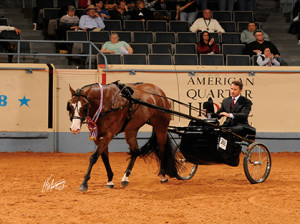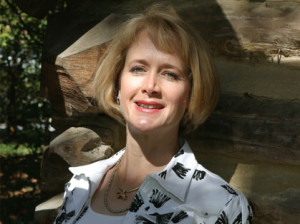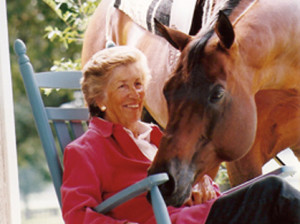What Direction Should AQHA Take Going Forward?
Click here to read the complete article
108 – November/December, 2014
By Sue Winslow
This past year, AQHA Executive Vice President Don Treadway announced his intention to retire in 2015 after forty years with the American Quarter Horse Association. Mr. Treadway has seen AQHA grow from a few thousand horses in America to the largest equine breed registry and membership organization in the world. The growth and popularity of America’s horse has been phenomenal until recently. With over five million horses and more than 275,000 members worldwide, the AQHA has grown from a breed registry into a full service membership organization that offers extensive benefits, services, and programs for all ages. This year, the American Quarter Horse Youth World Cup at the Brazos County Expo in Bryan, Texas included youth teams that represented 16 different countries.
Treadway, who will continue to work with the AQHA Executive Committee, is retiring as the AQHA is reviewing its organizational structure in an attempt to reduce expenses and increase income. The executive search firm, Witt/Kieffer, has been chosen to cull the herd of prospective candidates, and September 30, 2014 was the final day for resumé submissions. The firm intends to work closely with AQHA to develop a list of viable candidates with the right combination of skills and knowledge to effectively step into this important and highly visible role.
The Equine Chronicle spoke with some well-respected leaders in the horse industry to ask their opinions about what direction AQHA should take moving forward, from a ‘boots on the ground’ perspective.
Kevin Dukes
Owner of Dukes Performance in Weatherford, TX
EC: What direction should the AQHA take under its next Executive Vice President?
Dukes: “I would like to see the new EVP do a 180 and take our association in a totally different direction where big money and big business are not the primary focus, and go back in the direction AQHA was originally designed for and intended. We have a mission statement that outlines perfectly what our organization should be about. It uses words like preserve, integrity, welfare, growth, service, education, leader, humane, dignity, and compassion.
“I would like to see a new direction of openness with the membership. We have been perceived as a secretive [organization] with hidden agendas. We must do what we can to change that impression, because, to most people, perception is considered reality.
“Also, I would like to see our association openly own our mistakes and not let egos force us to sweep them under the rug or ‘come hell or high water’ push ahead with a bad idea. When we mess up, we need to say so and make the necessary changes to right the wrong.”
EC: What are some areas you think need improvement in the organization or industry? Are there particular issues you would like to see addressed?
Dukes: “I feel the majority of the voices being heard by AQHA consists of trainers; we generally have the most time and energy invested because this is our daily business. That being said, we must remember that our horse show world only represents a small percentage of our membership. Consequently, most of AQHA’s efforts go into what horse show people want, and the majority of our trainers don’t want to change. With any great change always comes great adversity. We really need the change, if we’re going to stop the rapidly declining numbers, start repairing our reputation in the horse world, and regain the respect the Quarter Horse deserves.
“Unfortunately, what we have created through our training and showing is a horse and a practice that’s hard for most people to swallow. Our product doesn’t resemble what our rulebook describes; yet we can’t stop the vicious circle because our trainers and judges are one in the same. As judges, we pick the style we have created, and as trainers, we must do what it takes to win to support our families.
“Our horse shows provide the face of AQHA, in terms of showcasing the Quarter Horse to the general public and prospective new members. Unfortunately, due to our styles and practices, most new people are turned off. The shows are no fun to watch, and neither horse nor rider looks like they’re having fun. As horse show people, this doesn’t affect us, because we’re totally desensitized. In order to gain new members and attract new people, we must look at everything through their eyes. Then, we must step back and honestly look at ourselves in the mirror. As trainers and judges, we need to look at the long-term effects our actions have on tomorrow and not what’s working for us today.”
EC: Are there beneficial programs that, in your opinion, should be continued or enhanced?
Dukes: “One very beneficial addition to our shows is the Ranch Horse Pleasure and the new Ranch Horse Division. These are the most popular classes at the shows with the numbers increasing at an amazing rate. Also, we’re seeing lots of new faces in the arena! The popularity stems from the normal horse lover being able to compete with their horses to the best of their ability. They don’t have to own an expensive outfit or alter their horse’s movement or headset. These folks look like they’re having fun!
“Another new program coming soon is a Walk-Trot Division. This will enable us to reach and expose children to the Quarter Horse at a much younger age. Another very popular and fast growing outlet in the greater horse world, that AQHA is considering, is Western Dressage. This division is attractive to the average horse lover on a budget who wants the opportunity to take their horse and compete with friends. This is a very user-friendly event, because you know exactly what time you will show and what time you will finish. There are many different levels from the beginner to the advanced, and trainers aren’t necessary.”
EC: Are there any other thoughts you would like to share on this topic?
Dukes: “I have great hopes for our future under new direction. I believe the AQHA is at a crossroads, and the path we take from here can be the difference between success and failure. We have some very strong leaders on our Executive Committee. They carry a huge burden of responsibility for our future as the voice of our membership. We need to become involved and let them know our feelings, because the real responsibility of success or failure is ours.
“The Quarter Horses and the AQHA is my passion, and I’m so blessed to be able to live the life I dreamed of as a child. My only desire is for my children and grandchildren to be afforded the same opportunities that I’ve had with this great horse.”
Lori Bucholz
AQHA Foundation Ambassador, AQHA Director, and multiple World Champion competitor who resides in Waterloo, Nebraska
EC: What direction should the AQHA take under its next Executive Vice President?
Bucholz: “AQHA needs to continue to enhance services for their members. In recent months, the association has implemented a ‘suggestion box’ that’s accessible on the website. Programs that are easy to execute and that have the potential to involve many members are good for growth, member retention, and expansion. Members should always feel their voices are being heard and that there is transparency in the association.”
EC: What are some areas you think need improvement in the organization or industry?
Bucholz: “Again, programs that involve keeping more members active and encouraged is good for the entire industry. I believe the organizations within the equine industry will have to continue to reach out to one another and form working relationships and further alliances. For example, the USHJA (United States Hunter Jumper Association) is introducing a new venture that’s designed to showcase and reward the AQHA hunter. That union is good for both associations. Those who show hunters can see that Quarter Horses are athletic and beautiful, and the Quarter Horse people can realize they have another venue in which to show. It results in growth, partnerships, and fostering relationships in both associations.”
EC: Are there particular issues you would like to see addressed? Are there beneficial programs that, in your opinion, should be continued or enhanced?
Bucholz: “I would like to see more use of webinar-based educational and online programs. In my opinion, our young trainers today need support to help grow their businesses and become more viable in the equine industry well into the future. They would benefit greatly from webinar-based programs that would address issues such as how to start and grow their business, knowing how to relate to clients, becoming more involved with their affiliates, what to do when tragedy strikes, and a multitude of other lessons that would support those just beginning their careers. Additionally, those webinars could be directed toward others in the industry, too. The programs could be designed to address problems that would help the affiliates, show managers, judges, and all who are involved in the industry, in an easy to follow format.”
EC: Are there any other thoughts you would like to share on this topic?
Bucholz: “The next Executive Vice President of AQHA will face a myriad of very daunting problems with his or her first step into Amarillo. There are litigation issues, a need to keep the association current in the ever evolving IT world, dwindling membership, competition from outside sources, horse welfare issues that are scrutinized in social media, event management…and that’s just the first day!
“The next EVP will have to speak, not only to those AQHA members in the USA, but to those in the ever-expanding international markets as well. This person will need to appeal to those who show, those who ranch, and those who are in the racing industry. Outside the office, there are lobbyists and those who are obstructionists to the horse industry and the agricultural way of life, who also need to be monitored. On top of all that, they need to try and have a family life of some sort!
“I do know the next Executive Vice President of AQHA will need a lot of support and cooperation from all AQHA members, whoever that new hire may be. I hope that he, or she, gets that help and support to lead this great association so it may expand and prevail for the next 75 years.”
Carol Harris
Owner of AQHA legend, Rugged Lark, and proprietor of Bo-Bett Farm in Reddick, Florida
Carol, like the others who shared their views on this topic, put a great deal of thought into the following response.
“Thank you for giving me an opportunity to share my thoughts regarding a search for AQHA’s new Executive Vice President. If we are lucky, I feel the direction we take will be determined by the ‘Superman’ we hope to hire. I’m not trying to be funny, but I feel this perfect man, in order to be successful, will have to possess all the best qualities of Donald Trump, John Wayne, and George Morris. If we are fortunate enough to find someone like that, I believe he might be able to properly address and reorganize all the areas that seriously need attention. Even then, he will probably need a little help from God!
“Whoever we find to take this position of responsibility will need to have unimpeachable integrity, outstanding leadership capabilities, and total commitment to the welfare of our horse, with no agendas or allegiance to specific causes or groups of people. The American Quarter Horse must come first, over and above any other interests.
“My vision for AQHA would include many, many changes, because what we’ve had obviously is not working. This person, in order to be successful in returning AQHA to its once highly regarded leadership position, will have to be skilled at untangling a web that has been spun around our horses and countless activities we have been expected to support. Understanding the all-important value of simplicity and overseeing a return to an austere management system that reflects transparency and fiscal responsibilities are imperative if we are ever to regain the trust of our membership. ‘Cleaning the closet’ of undesirable influences from the past will require someone with great strength of character and intelligence, since we suspect many entrenched individuals could be guilty of permitting and furthering negative effects of past indiscretions, from which our organization has paid dearly.
“This person must possess the ability to listen to all parties, including staff, the Executive Committee, and members without hearing voices who could very likely attempt to minimize the existing problems that have caused our decline.
“Our mission statement names five specific areas of commitment, which we should all read. However, this time when we read it, we should not forget the undisputable welfare of the horse. Whenever we read our mission statement, we must have the ability to recognize programs that are not working as intended and be willing to recommend to the Executive Committee the termination of all causes, no matter whose pet projects may be involved.
“Some areas badly in need of improvement and/or changes are as follows.
1. Of great importance – Our headquarters in Amarillo must be returned to its former knowledgeable, warm and friendly state, as in years past, and our Executive Vice President must foster a hospitable atmosphere.
2. The Rule Book should be rewritten, reorganized, and simplified with obvious emphasis placed on important rules.
3. Each class should have descriptions of its purpose with its rules applicable to all purposes.
4. Rules should be enforced with no exceptions, and rules should not be changed in the middle of the year.
5. Education for all disciplines should be made available to judges and, occasionally, members through the expertise of carefully educated and prepared clinicians.
6. Proper traditions should be created and respected for all disciplines, and attire and horse tack should tastefully relate to the purpose of each class, respecting affordability for exhibitors.
7. Judges, stewards, and exhibitors are responsible for knowing all rules involving their disciplines. Leadership, staff, and members should be responsible for knowledge of important rules.
8. The enforcement of all rules must be accomplished consistently, strictly, and fairly.
“Today, we definitely have a need for unity. In many cases, we are divided with different agendas and little appreciation for each other’s interests or problems. Together, as members, we should strive for a common goal. At one time, we seemed to be more concerned with the proper development of our horses. Today, everything seems to be more about ourselves: how we look, how we act, what we wear, and how much we donate.
“Some of us have become favorites in the industry, and some of us have been basically ignored, not included, not invited to participate on committees, nor even feel appreciated. Unfortunately, it seems the greatest appreciation comes from money and the frequency in which it is contributed.
While each of these professionals, who so graciously responded, point out unique areas of concern, they all agree that the new AQHA Executive Vice President will have a difficult job once they take the reins of AQHA. With the growth of the organization into a worldwide entity, the Executive Vice President will have to wear many hats: listener, leader, diplomat, and innovator. Professionals in the industry have become more business savvy in order to survive in our challenging economic times, and the right choice for this important role hopefully will shepherd a new era of growth while respecting the original concept and purpose of the American Quarter Horse Association.














